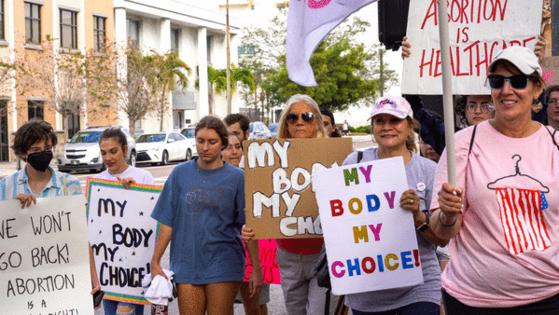Abortion, weed donors make Florida ballot questions highest-funded in US
Published in News & Features
TAMPA, Fla. — This election season, the two most expensive ballot initiatives in the country are in Florida.
Supporters of the campaigns to expand abortion access and to legalize recreational marijuana have contributed more than $178 million since summer 2022. That makes them the two costliest ballot measures in the state in at least two decades, according to campaign finance research nonprofit OpenSecrets.
Opponents of the campaigns have also raised more than $25 million. Still, for every dollar given in opposition, supporters have given seven.
Money raised in support of the amendments has gone to petitioners who got enough signatures to put them on the ballot, as well as to create and broadcast advertisements for them. Donations against the measure are paying for ads.
Amendment 3, to legalize marijuana for people 21 and older, and Amendment 4, to protect abortion access until viability, both relate to social and moral policy issues that often are salient among voters, said Binghamton University public administration professor Matthew Uttermark.
Plus, he noted, if the marijuana amendment passes, big businesses stand to profit.
Donations supporting the abortion amendment tend to be in smaller dollar amounts compared to those supporting the marijuana amendment.
The average pro-legal marijuana donation was $131,566, compared to $986 from the typical pro-abortion rights donor.
Florida has had a stronger opposition to the marijuana amendment than other states have, requiring more money from its supporters, said Steve Reilly, an executive at cannabis firm Insa.
“You have a popular governor that’s opposing it, you’ve got the Republican Party and you’ve got a significant amount of elected officials and existing political infrastructure in Florida that oppose the question,” he said.
The biggest individual donors in opposition to either campaign have been conservative billionaire and DeSantis megadonor Kenneth Griffin and Trish Duggan, a Scientologist who has given hundreds of millions to the church and owns a home in Belleair Shore.
Top supporters are billionaires as well: Democratic activist Marsha Laufer and philanthropist Lynn Schustermann.
Does funding matter?
Reilly said amendment fundraisers’ main goal is spreading awareness. He said people may be slightly more persuadable on the marijuana measure than they may be on abortion.
“A lot of people come to Amendment 3 with some perceptions of whether or not they support it already, but there is still a group that’s undecided, and I think it’s gonna be a close vote at the end of the day, and small movements will make a big difference in terms of being passed or not,” he said of the marijuana amendment.
The limited public polling has also indicated that voters are generally supportive of both ballot measures. They need the support of 60% of voters to pass.
According to Uttermark, there is no evidence that spending on advertising affects voter turnout or the chances a voter completes their ballot, but it can persuade some to vote one way or another.
Reilly said former President Donald Trump’s endorsement of the marijuana amendment was important because it was likely to increase support among Republicans, a demographic he said had been more difficult to persuade.
He also said that the presidential election will influence whether the marijuana amendment passes or not because it will determine who shows up to vote on Election Day. Younger voters and Democrats are more likely to support legalization, according to a Pew Research Center survey from January.
Florida supporters are attempting to follow several other states that legalized marijuana and abortion rights protections through voter initiatives. Although funding for the amendments is overwhelmingly from Florida, donors from Washington, D.C., California and Oklahoma have made major contributions in support of both amendments.
Abortion rights supporters have found success through ballot measures in states that have changed policies to restrict access following the repeal of Roe v. Wade, Uttermark said.
“It’s been one of the few areas that they’ve been able to meaningfully change policies back,” he said.
“And this is, this is the opportunity for interest groups that are not happy with the current status quo and policy. This is an opportunity for changing that policy in Florida. So I think Florida is following some national trends in that respect,” he added.
---------
©2024 Tampa Bay Times. Visit at tampabay.com. Distributed by Tribune Content Agency, LLC.







Comments